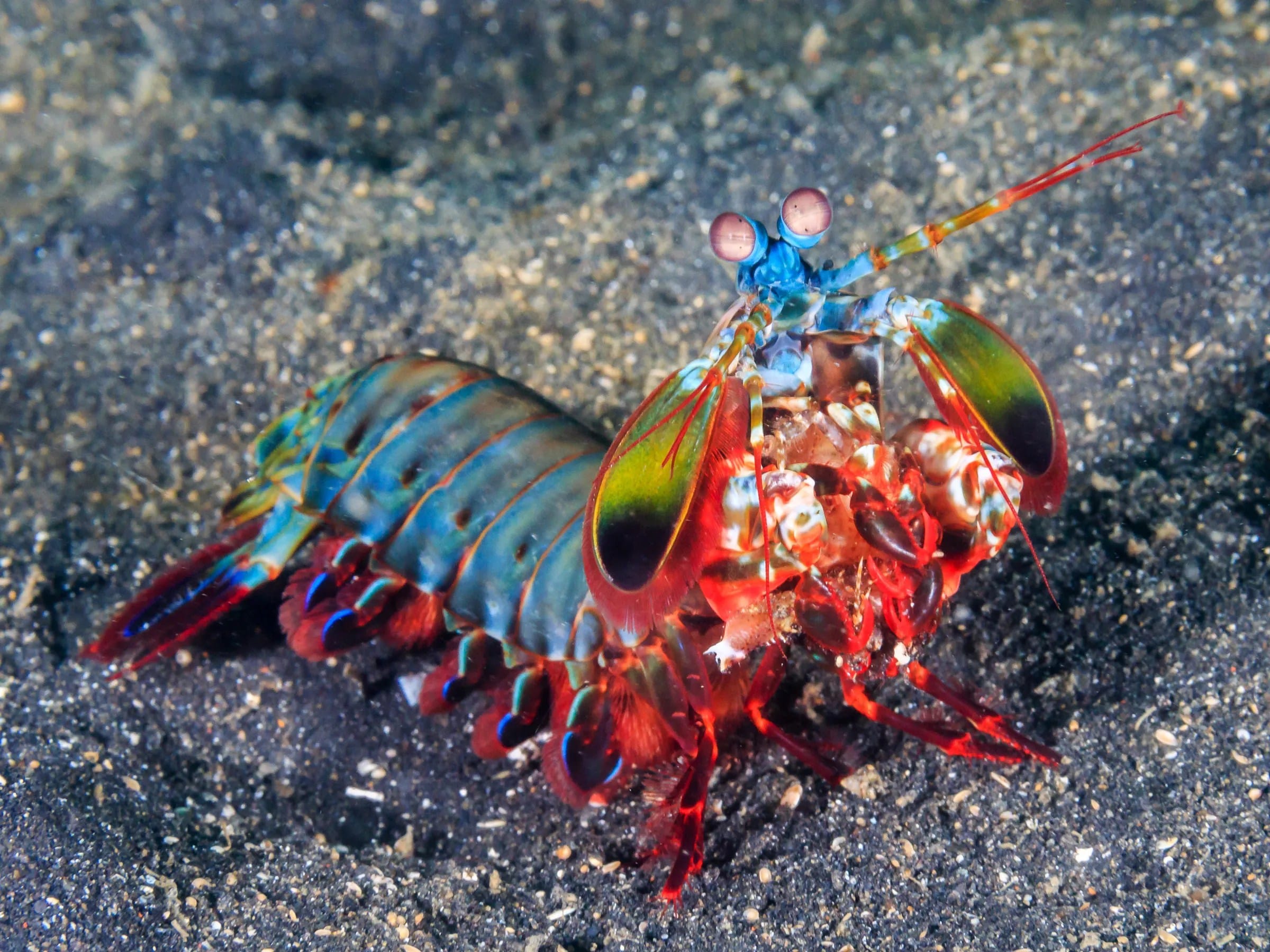Epic Clash of Miniature Crustaceans
Get ready to dive into the world of two underwater heavyweights: the pistol shrimp and the mantis shrimp. These tiny titans, though small in stature, possess incredible weaponry and hunting prowess. Let’s uncover the secrets behind their epic underwater showdown.
Size and Appearance: A Study in Contrasts
The pistol shrimp, the smaller of the two, measures a mere 3-5 cm. It’s recognizable by its reddish-white body, ten legs, and one noticeably oversized claw. This claw is the source of its remarkable power.
The mantis shrimp, a significantly larger crustacean ranging from 10-20 cm, boasts a vibrant array of colors. Its most striking features are its powerful raptorial appendages – imagine spring-loaded boxing gloves, but much sharper, designed for delivering devastating blows.
Hunting Strategies: Sonic Boom vs. Knockout Punch
The pistol shrimp is a master of sonic warfare. By snapping its oversized claw with blinding speed, it creates a cavitation bubble. This bubble implodes with such force that the resulting shockwave can reach an astounding 210 decibels—louder than a gunshot! This sonic blast stuns prey and is also used for communication. Hermits crabs are a unique and fascinating creatures that deserve the best care. When it comes to providing them with a healthy and comfortable home, you can’t go wrong with seashells for hermit crabs. These natural shelters offer a number of benefits for your hermit crab, including protection from predators, a place to hide and rest, and a source of calcium for their exoskeletons.
The mantis shrimp takes a more direct approach. “Smashers” pulverize prey with the force of a .22 caliber bullet, shattering shells with ease. “Spearers,” armed with sharp appendages, impale their meals with precision.
Habitat and Vision: Contrasting Lifestyles
Pistol shrimp are social creatures, often found in coral reefs and seagrass beds, sometimes forming symbiotic relationships with other marine life. Mantis shrimp, on the other hand, are solitary and prefer the sandy or rocky ocean floor, where they dig burrows or hide in crevices, waiting to ambush their prey.
While pistol shrimp have limited vision, relying on other senses, mantis shrimp possess the animal kingdom’s most complex visual system. They can perceive ultraviolet and polarized light, experiencing a world of color and detail beyond human comprehension.
Danger to Humans: Minimal vs. Moderate
A pistol shrimp’s sonic snap, while startling to nearby divers, poses little threat to humans. The mantis shrimp, however, can inflict painful blows with its powerful strikes, potentially breaking skin. Admiration from a safe distance is recommended.
Beyond the Battle: Inspiration and Research
The pistol shrimp’s snapping mechanism has sparked interest in engineering and robotics, potentially inspiring the development of plasma-shooting robotic claws. Ongoing research also explores the shrimp’s ecological role and symbiotic partnerships.
The evolutionary “arms race” between mantis shrimp and their prey continues to fascinate scientists. Research suggests that ongoing adaptations are crucial for conservation efforts, as habitat loss threatens both species.
Are Pistol Shrimp and Mantis Shrimp the Same?
The shared “shrimp” moniker can be misleading. While both are crustaceans, they belong to distinct branches of the family tree. Pistol shrimp are “true shrimp” (Alpheidae), while mantis shrimp belong to the Stomatopoda order. Their differences extend beyond lineage.
Pistol shrimp are relatively peaceful, using their sonic snap primarily for hunting small prey and defense. Mantis shrimp are aggressive predators, employing powerful claws to crush shells or spear-like appendages to impale soft-bodied creatures.
Mantis shrimp also possess exceptional vision, capable of seeing a wider spectrum of colors and polarized light than pistol shrimp. Some research even suggests they may be able to detect cancer cells. A comparison table highlights these key differences:
| Feature | Pistol Shrimp | Mantis Shrimp |
|---|---|---|
| Classification | True shrimp (Alpheidae) | Stomatopoda |
| Primary Weapon | Sonic shockwave | Powerful claws/spears |
| Size | Smaller | Larger |
| Vision | Typical crustacean vision | Exceptionally complex vision |
| Behavior | Relatively peaceful | Predatory and aggressive |
Ongoing research continues to uncover new information about these fascinating creatures, promising further insights into their unique adaptations and behaviors.
Who Has the Stronger Punch: Mantis Shrimp or Pistol Shrimp?
While both shrimp pack a punch, their approaches differ significantly. The mantis shrimp, like a heavyweight boxer, delivers devastating blows with its club-like appendages, capable of shattering aquarium glass. This power comes from the initial impact and the cavitation effect, where collapsing bubbles amplify the force.
The pistol shrimp, more like a martial artist, relies on a precise sonic boom generated by its snapping claw. This incredibly fast snap creates a miniature underwater explosion powerful enough to stun or kill small creatures.
While the pistol shrimp’s snap is likely faster, the mantis shrimp’s strike delivers significantly more force due to its larger mass. The pistol shrimp uses its sonic boom primarily for defense, while the mantis shrimp uses its punch offensively for hunting and territorial disputes.
These remarkable abilities are products of millions of years of evolution, and ongoing research continues to unravel the intricacies of their adaptations. While the mantis shrimp likely has the stronger punch in terms of sheer force, both shrimp are perfectly adapted to their respective niches.
Is the Pistol Shrimp the Strongest?
The pistol shrimp’s sonic blast is undeniably impressive, but it likely isn’t the strongest force in the underwater world. The mantis shrimp, with its bone-crushing blows, holds that title.
The pistol shrimp’s sonic weapon, created by the rapid snapping of its claw, generates a powerful shockwave. However, the mantis shrimp relies on brute physical strength and specialized appendages that can be swung with incredible speed, generating enough force to break aquarium glass.
The mantis shrimp’s larger size and robust armor also give it a significant advantage. While the pistol shrimp’s sonic abilities are remarkable, the mantis shrimp’s combined speed, force, cavitation effect, and size make it a more formidable opponent.
| Feature | Pistol Shrimp | Mantis Shrimp |
|---|---|---|
| Primary Weapon | Sonic Shockwave | Club-like/Spear-like Appendages |
| Attack Mechanism | Cavitation Bubble Collapse | Physical Strike + Cavitation |
| Typical Size | ~2 inches | Up to 15 inches |
| Prey | Small fish, invertebrates | Crabs, snails, other crustaceans |
Current research continues to explore the intricacies of both species’ adaptations, promising further insights into their fascinating world. While the pistol shrimp’s sonic power is extraordinary, in a head-to-head matchup, the mantis shrimp would likely prevail. Both species, however, demonstrate the incredible diversity and adaptability of life in our oceans.
- Unlock 6000+ words beginning with he: A comprehensive analysis - April 20, 2025
- Mastering -al Words: A Complete Guide - April 20, 2025
- Master Scrabble: High-Scoring BAR Words Now - April 20, 2025

















1 thought on “Pistol Shrimp vs. Mantis Shrimp: A Tiny Titan Showdown”
Comments are closed.